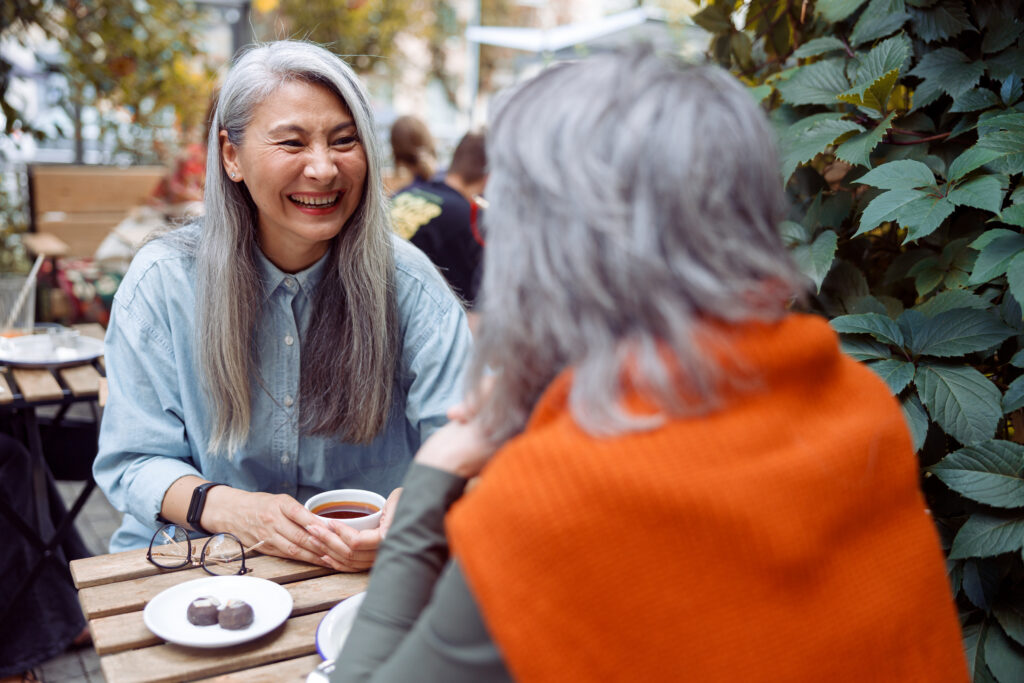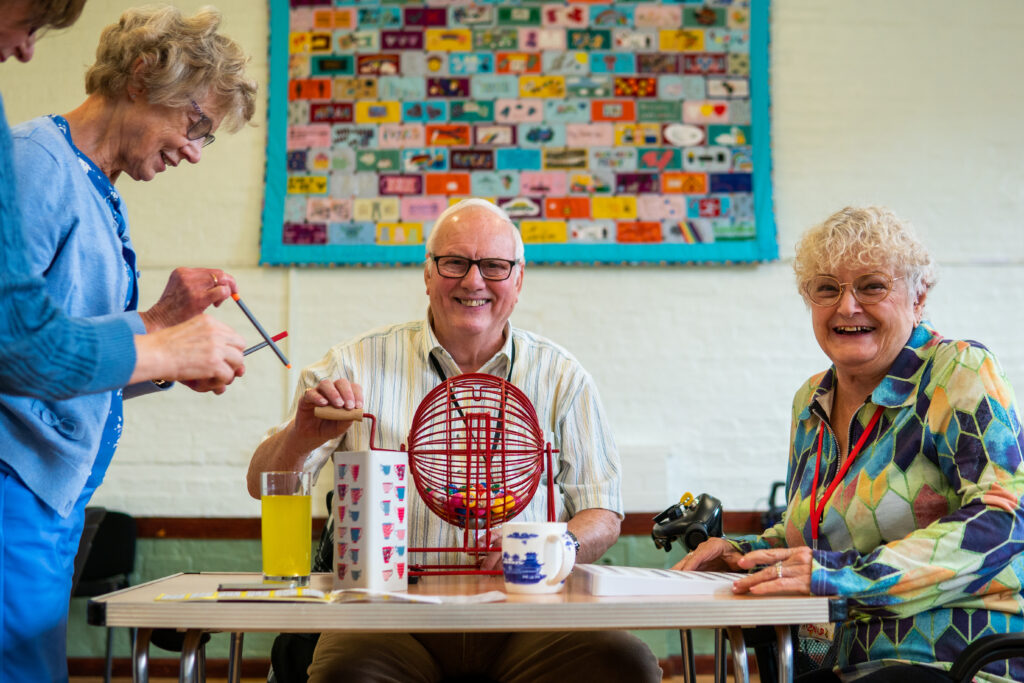
Friendships and community for older women
Friendships and being involved in community play an important role as we age. There’s a common perception that older age equates to loneliness. Given that men tend to have shorter lifespans than women, many older women in heterosexual relationships might find ourselves alone.
While the size of our social network might reduce as we age, the good news is older women usually continue to have close friends and supporting, fulfilling relationships.
Over the years, experience teaches us the art of resolving differences and reducing conflicts. This wisdom often means we get more satisfaction from our social connections later in life. Relationships with people our own age become increasingly significant. Sharing life stories, engaging in mutual hobbies, and having similar life experiences provide a sense of understanding and validation.

The value of relationships with people our own age should not be underestimated. Such bonds can influence our quality of life as we age and our experience of ageing. Friendships, which can span across our life, remain a cornerstone of social connection, particularly in later years when other relationships might change or cease. Research consistently shows the many benefits of friendship at all stages of life.
Women also generally have wider social networks compared to men. Throughout life, we tend to both give and receive more support, relying significantly on friends, family, and children for such interactions.
Community and interest groups for older Australians
Whatever your interest, there is likely to be a group that you can join where you can meet people of all ages who share your passion. Many older adults also find joining social or activity-based groups rewarding and a way to meet like-minded peers. We have included just a few examples here – scroll down for a longer list.
- As well as the wonderful group All the Queens Men, which run queer and ally-friendly social dance events in various locations around Australia, you might want to check out Swing Patrol – they operate in Brisbane, Sydney and Melbourne, offering lessons as well as social dance nights for all ages and abilities. And you don’t need a partner to attend! There are other dance clubs out there too, offering classes in a variety of styles – from salsa to ballroom.
- If a sport, such as bowling or cycling appeals, the Council of the Aged Victoria runs COTA Cycling, which meet every Wednesday for group rides; and there are other similar groups around Australia.
- If you love singing, joining a choir is a wonderful way to meet people – and the Australian National Choral Association is searchable by location so you can easily find a community choir running near you.
- The University of the Third Age also offers courses for older people, run by volunteers, on a huge range of subjects from music to history to physical activity.
- Local city councils also offer a wide range of community classes and groups; and there are community-specific groups too. Spending a bit of time online searching for groups in your interest area will uncover all sorts of exciting options.
Volunteering and community participation

Volunteering in an area you’re passionate about can make you feel better and less lonely. Both older men and women like to volunteer, with around 25 to 30% doing so. However, women between 55-69 years old often have more caring responsibilities, which can mean we have less time to volunteer.
Joining a community group or volunteering can be especially good for older women who come from migrant or refugee backgrounds. It can help to break down social and language barriers which might make some people feel alone. Being part of a group of people who have the same interests or background can help us to feel supported.
Likewise, older adults from the LGBTQIA+ community can feel supported and welcome in groups that respect and celebrate everyone, no matter who they love or how they identify. There are groups that cater to different communities as well as different interests, and we have listed some below.
After more information? These resources may help
- COTA (Council on the Ageing) has a page on social and wellbeing information as well as information for LGBTIQA+ elders.
- ACON support for older LGBTQIA+ people.
- Friendline is a phone service to have a chat with someone.
- Look for a Chatty Cafe near you – a local cafe that provides a table where you can sit and chat with others also looking for a good conversation and to meet new people.
- The community group All the Queen’s Men host annual LGBTQI+ Elders dance events around Australia.
Keen to read more about older women and friendship? Here are a few articles:
- Are female friendships the key to happiness in older women? Psychology Today, 2018
- Finding friends after 50 can be hard. These women figured it out. SBS News, 2019
- Women with satisfying relationships have fewer chronic illnesses. UQ News, 2023
Choi NG, Ha JH (2016) Relationships between spouse/partner support and depressive symptoms in older adults: Gender difference. Aging and Mental Health Aging Ment Health 15(3), 307–317.
Ewings SJ (2019) Unique challenges facing older Australian women in the early twenty-first century. The University of Sydney.
Farrugia T, Hewitt A, Bourke-TH, Joosten A (2019) The impact of carer status on participation in healthy activity and self-reported health among Australian women over 50 years. Australian Occupational Therapy Journal. 66(1): 23–32.
Feldman S, Radermacher H (2019) Vital conversations: giving older women in greater Melbourne a voice. Lord Mayor’s Charitable Foundation, Melbourne.
Fuller H, Pikala T, Mullen A (2022). Strengthening late-life family connections. North Dakota State University.
Guven S, Sener A (2010). Family relations in aging. International Journal of Business and Social Science 1(3).
Haslam C, Dane S, Lam BCP, Jetten J, Liu S, Gallois C, et al. (2022) Ageing well in a foreign land: group memberships protect older immigrants’ wellbeing through enabling social support and integration. Ageing And Society. 42(7), 1710-1732.
Lixia Q, Kaspiew R, Carson R, De Maio D, Harvey J, Horsfall B (2021) National elder abuse prevalence study: Final report . Australian Institute of Family Studies.
Luong G, Charles ST, Fingerman KL (2011) Better with age: Social relationships across adulthood. Journal of Social and Personal Relationships 28(1), 9–23.
Mohanty I, Niyonsenga T, Cochrane T. et al. (2020) A multilevel mixed effects analysis of informal carers health in Australia: the role of community participation, social support and trust at small area level. BMC Public Health. 20(1801).
MCWH (2021) Submission into the Inquiry into Support for Older Victorians from refugee and migrant backgounds. Multicultural Centre for Women’s Health, Melbourne.
Pope ND (2022) Older women caring for others and needing care. Journal of Women and Ageing 34(6), 687-691.
Sharma N, Chakrabarti S, Grover S (2016) Gender differences in caregiving among family - caregivers of people with mental illnesses. National Centre for Biotechnology Information.
Thomas PA, Liu H, Umberson D (2017) Family relationships and well-being. Innovation in Ageing 1(3).





